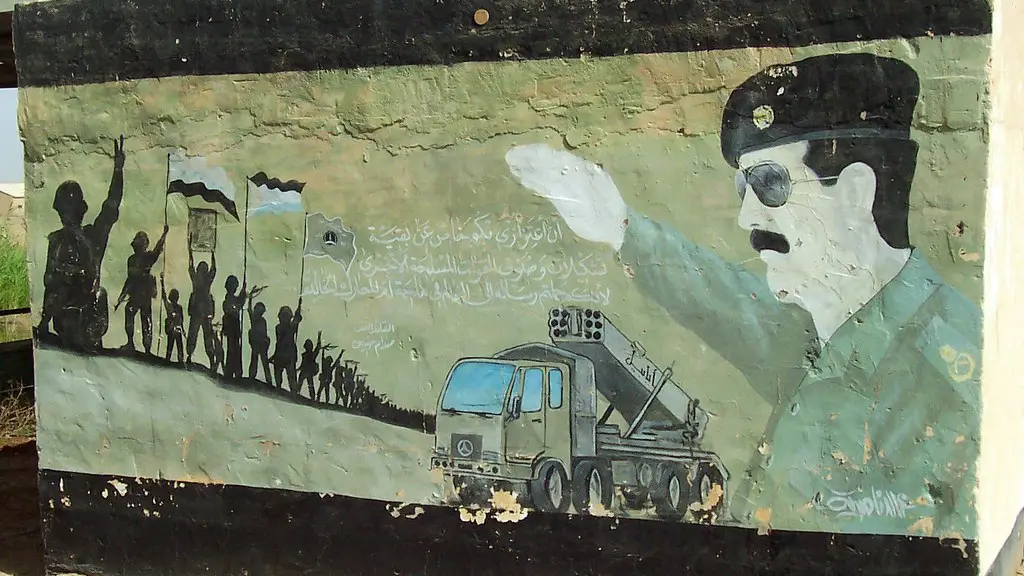There is no single answer to the question of whether Saddam Hussein was secular. Saddam Hussein’s regime was characterized by a mix of religious and secular influences. Saddam Hussein himself was a Sunni Muslim, but promoted a secular Ba’athist ideology in his government. Under Saddam Hussein’s rule, Iraq had a Muslim majority population, but religious minorities such as Christians and Yazidis were also represented. Saddam Hussein’s government majority religious, but did not implement Sharia law, instead opting for a secular legal system. The question of whether Saddam Hussein was secular is therefore complex, and depends on how you define secularism.
There is no definitive answer to this question as there is much debate surrounding Saddam Hussein’s religious beliefs. Some believe that Saddam Hussein was secular, while others believe that he was secretly a devout Muslim.
What was Saddam Hussein’s religion?
Saddam adhered to an eccentric interpretation of Islam that Ba’thist intellectuals had developed in the mid-twentieth century. For him and many other Ba’thists, Islam was the religion of the Arabs Muhammad was an Arab prophet who preached a divine message intended for his Arab followers.
Iraqi Neo-Ba’athism is the ideology followed by Saddam Hussein that stipulates that Arab states should look to Iraq as the leader of the Arab “nation.” This ideology invokes militarist and nationalist rhetoric and policies.
Was Iraq a secular country
Iraq became a secular state in 1932 after its independence. However, the Ba’athist regime led by Saddam Hussein launched the Return to Faith campaign in 1993 and placed significant emphasis on Islam within all sectors of state and public life. This campaign led to the Islamization of Iraq, with Saddam Hussein using Islam to legitimize his rule. After the 2003 invasion of Iraq, the country has seen a resurgence in Islam, with Islamic parties and groups playing a significant role in politics and society.
Christians in Iraq have long been a persecuted minority, and the 2003 US-led invasion that toppled Saddam Hussein only made things worse. In the years since, Christians have been targeted by Islamic extremists and have been forced to flee their homes in droves. Today, there are only a handful of Christians left in Iraq, and their future is uncertain.
Is atheism allowed in Iraq?
Atheism is not illegal in Iraq, but State actors typically equate atheism with blasphemy. Although there are not any articles in the Iraqi Penal Code that provide for a direct punishment for atheism, the desecration of religions is penalised.
Islam is the official religion of 95 to 98% of the population in Iran. Christianity is the largest minority religion, with 125% of the population practicing it. Yazidism is also a minority religion, practiced by 125% of the population. There are also a number of irreligious people in Iran, as well as followers of Yarsanism, Zoroastrianism, Bahá’í, and Mandaeanism.
What did Saddam Hussein do that was good?
Hussein has been lauded in the past by some for modernizing Iraq, using its oil wealth to improve conditions for the general population. However, his human rights record is dismal, and he has been accused of egregious abuses. Nonetheless, his death marks the end of an era for Iraq.
Saddam Hussein was born in Iraq in 1937. He was the President of Iraq from 1979 until 2003 when he was overthrown by the United States. Hussein was known for his strong authoritarian rule and for his aggressive foreign policy. His government was also accused of human rights abuses and of using chemical weapons against its own people.
Why is Saddam Hussein seen as a hero
Saddam Hussein was an Iraqi leader who was known for his strength and honesty. He was helpful to Jordan and gave gifts to the people, not just the government. Saddam was a man who was respected by many.
It is interesting to note that the top 5 countries with the highest possible ranges of agnostics and atheists are all located in Europe or Asia. This could suggest that there is something about the culture or values in these regions that are more conducive to atheism or agnosticism. Additionally, it is worth noting that all of these countries have high levels of secularization, which may also be a contributing factor.
What religion was Iraq before Islam?
Iraqi Christians have been subject to religious persecution for centuries, most notably during the Ottoman Empire when thousands were killed or forcibly converted to Islam. In recent years, the situation for Christians in Iraq has deteriorated dramatically, with members of the community being targeted by Islamic extremists.
Today, it is estimated that there are only around 250,000 Christians remaining in Iraq, down from around 1.4 million in 2003. The vast majority of Iraqi Christians belong to the Chaldean Catholic Church, with smaller numbers of Syriac Orthodox and Armenian Orthodox Christians. Many Iraqi Christians have been forced to flee the country in recent years, with many finding refuge in neighbouring countries such as Lebanon, Jordan and Syria.
There are a total of 51 muslim majority countries in the world, out of which 21 countries are secular. These countries are Albania, Azerbaijan, Bosnia-Herzegovina, Burkina Faso, Chad, Guinea, Guinea-Bissau, Indonesia, Kazakhstan, Kosovo, Kyrgyzstan, Lebanon, Mali, Mauritania, Niger, Senegal, Serbia, Tajikistan, Turkey and Turkmenistan. These countries have been able to maintain a secular atmosphere despite being in a majority-muslim region.
Did the US ever support Saddam Hussein
The US intelligence agencies provided critical assistance to Saddam Hussein’s military during the Iran-Iraq war. This included combat planning assistance and battlefield intelligence in the form of satellite imagery. This intelligence helped the Iraqi military to better target their attacks and ultimately achieve victory against the Iranians.
Iraq is a country with a rich and vital contribution to Christian history. After Israel, Iraq has the most biblical history of any other country in the world. The patriarch Abraham was from Uruk, in southern Iraq, modern day Nasiriya, and Rebecca was from northwestern Iraq, in Assyria. Iraq is also the site of the ancient city of Babylon, which was an important center of Mesopotamian civilization.
What is the number 1 religion?
Christianity is the world’s largest religion, with over 24 billion followers. The United States has the highest number of practicing Christians, with 253 million people. Christianity is a monotheistic religion that believes in the teachings of Jesus Christ. Christians believe in the Bible as the authoritative source of religious teachings and follow the principles of love, forgiveness, and compassion. Christianity is the largest religion in the world and has a significant impact on culture and society.
The Chaldeans are a unique and fascinating group of people with a rich history dating back thousands of years. Today, they are Aramaic-speaking Eastern Rite Catholics who maintain a strong presence in Iraq, the land of their ancestors. While they have faced many challenges over the centuries, the Chaldeans remain a proud and vibrant community.
Was Iraq better under Saddam
It’s no surprise that Iraqis are sick of their way of life. After years of American intervention and support for Saddam, followed by war and sanctions, Iraq has become a rich and dangerous place to live. If anything, the fact that Iraqis are still living in such conditions despite all the American help is a testament to their strength and resilience.
The Iraq War was justified by the US government on the grounds that Iraq was in possession of weapons of mass destruction and was supporting terrorism. The US claimed that by disarming Iraq and removing Saddam Hussein from power, they would be able to free the Iraqi people. The Iraq War lasted from 2003-2011 and resulted in the death of over 4,000 US soldiers and tens of thousands of Iraqi civilians.
Warp Up
Saddam Hussein was a secular leader.
Yes, Saddam Hussein was secular. He didn’t believe in religious interference in government, and he was tolerant of all religions. He also kept Iraq secular, which is one of the reasons why there was so much religious violence in the country after he was toppled.





